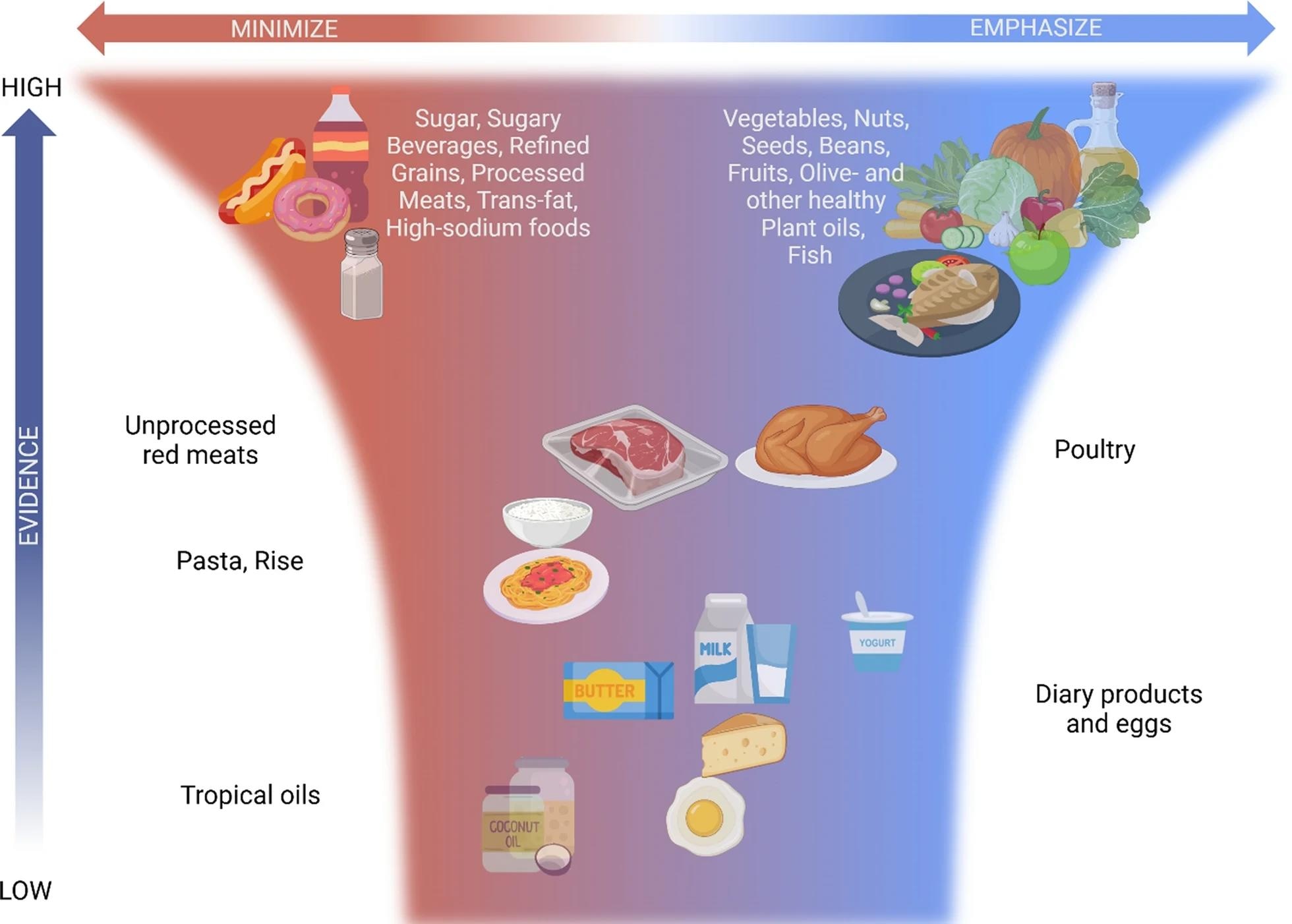What is the best diet to reduce heart disease and risk of diabetes? Research suggests that a back-to-basics approach may be the key to overcoming the fad diet trend.
 Study: The impact of dietary interventions on cardiometabolic health. Image credit: New Africa/Shutterstock.com
Study: The impact of dietary interventions on cardiometabolic health. Image credit: New Africa/Shutterstock.com
A recent paper published in the journal Cardiovascular Diabetology reviews dietary interventions for cardiometabolic health. An unhealthy diet predicts a higher risk of obesity, type 2 diabetes, and cardiovascular disease (CVD). These cardiometabolic diseases are significant causes of illness and death in adults worldwide, with large health and economic impacts.
Introduction
Metabolism is the total of cellular processes that release energy from food to sustain life. It controls the energy balance, inflammatory and immune responses, and physical performance. Metabolic biomarkers help monitor cardiometabolic health and other risk factors, such as blood pressure.
Excessive energy intake elevates blood glucose levels. This triggers higher insulin production by the pancreas. In response, liver production of glucose stops. Instead, it converts carbohydrates to fats, mostly triglycerides. The liver becomes fatty and insulin-resistant.
Even small increases in blood glucose can raise insulin levels. In response, the liver releases very low-density lipoproteins (VLDL), which carry fat to various organs, including the pancreas. At the same time, the liver swaps triglycerides for cholesterol in both high-density (HDL) and low-density lipoproteins (LDL), resulting in the formation of small LDL particles, which can develop into plaques in the arteries.
This “lipid triad” of insulin resistance, high triglycerides, and low HDL and LDL is a marker of poor cardiometabolic health.
Excess fatty acids in the pancreatic islets can impair insulin secretion after meals, resulting in elevated blood glucose levels. This triggers a cycle in the liver and pancreas, resulting in beta-cell failure and the rapid onset of clinical diabetes. However, improving metabolic health through dietary and lifestyle changes can have dramatic benefits, as large-scale public health interventions have shown.
The impact of diet
Evolutionary scientists suggest that human metabolism is designed for a highly active life, physical stressors, and minimally processed foods.
The role of animal protein in the ancestral diet remains unclear. However, Neanderthals may have consumed a variety of foods, including plants (such as fruits, vegetables, and tubers) and animal meat, like wild game, as modern hunter-gatherer communities still do. Coupled with their active life, this explains why few people are obese or hypertensive.
Bone isotope and dental calculus analysis suggest that Neanderthals and early humans consumed both plant and animal foods, although the exact ratios are still debated.
Dietary macronutrients
A stable energy balance is key to maintaining a healthy body weight.
Carbohydrates
Carbohydrates, preferably complex starches, are a primary fuel. Starches break down during digestion into simple sugars, such as glucose, which can be used or stored as liver or muscle glycogen.
A high intake of simple sugars and refined grains, such as sugary drinks, most bakery products, white bread, white rice, refined pasta, and chips, strongly predicts long-term weight gain and diabetes. This association is exceptionally high for sugary drinks. Low-carbohydrate diets induce weight loss and glycemic control.
Fiber
Dietary fiber from plant foods comprises polysaccharides, such as cellulose and pectins, and non-starch polysaccharides, including lignin and suberin. Undigested fiber feeds beneficial gut microbes and reduces the risk of cardiometabolic disease, tooth decay, and colon disease in a dose-dependent manner.
Fats
Most organizations no longer recommend reducing total dietary cholesterol, but the consumption of saturated fats, such as those found in coconut or palm oil, remains a topic of debate. Polyunsaturated or monounsaturated fatty acids (PUFA and MUFA, respectively) from nuts, seeds, and vegetable oils may reduce cardiovascular risk and mortality and prevent diabetes.
Although concerns have been raised that omega-6 fatty acids are pro-inflammatory, a pooled analysis and recent research indicate that these fats are not harmful and may be beneficial for diabetes prevention.
Despite their high saturated fat content, dairy products reduce cardiovascular risk in moderate amounts. However, the evidence for dairy, especially high-fat dairy, is mixed. Some studies find moderate intake to be neutral or protective, but very high intake to be potentially harmful.
Even with the high phospholipid and cholesterol content, moderate egg consumption is unlikely to harm cardiometabolic health. Nevertheless, some studies have linked egg components to a higher CVD risk, so further research is needed before making firm recommendations.
Protein
Dietary proteins are necessary for muscle protein and appetite regulation. Plant-based proteins can improve metabolic health, while high meat intake (more than 1-2 servings per week), particularly processed meat, may increase the risk of diabetes.
Higher protein intake and strength training may prevent muscle loss in older adults. Conversely, protein restriction in youth and middle age could reduce cancer risk and overall mortality. Both the amount and source of protein seem relevant, as plant-based sources appear preferable for cardiovascular health.
Other
Ultra-processed foods (UPFs), like processed meats, refined sugar, and refined grains, promote weight gain and cardiometabolic disease. The NOVA classification categorizes foods by their level of processing, with UFPs most strongly associated with adverse health effects such as increased caloric intake and weight gain.
In observational studies, artificial sweeteners (erythritol, aspartame, acesulfame potassium, and sucralose) are associated with an increased risk of diabetes, cardiovascular disease, and death. However, causation has not been established as the evidence is primarily observational and subject to confounding.
Even low-to-moderate drinking may increase the risk of cancer, obesity, and CVD. Although some studies show that moderate alcohol consumption could be associated with lower cardiovascular risk, the evidence is inconsistent, and guidelines discourage alcohol intake for CVD prevention.
Dark chocolate may help lower blood pressure and reduce the risk of blood clots. Moderate coffee consumption may reduce cardiovascular risk and serum uric acid levels. However, the credibility of the evidence for chocolate is low, and other lifestyle factors may confound the research on coffee.
 Central illustration. General dietary recommendations for cardiometabolic health. Visual representation of common foods and the level of general consensus regarding the strength of evidence (foods in the upper part have wide consensus), as well as the general recommendations (foods on the right should be emphasized in the diet)
Central illustration. General dietary recommendations for cardiometabolic health. Visual representation of common foods and the level of general consensus regarding the strength of evidence (foods in the upper part have wide consensus), as well as the general recommendations (foods on the right should be emphasized in the diet)
Popular diets
The Mediterranean diet has striking cardiometabolic benefits and is strongly protective against coronary heart disease despite moderate alcohol intake.
The Dietary Approaches to Stop Hypertension (DASH) diet has been shown to reduce blood pressure and decrease the risk of coronary heart disease and stroke by 15% and 27%, respectively. However, these estimates are based on population studies, and the benefits may vary.
Vegetarian diets are sustainable and nutritious, which can decrease the risk of diabetes and overall mortality. David Jenkins’ Portfolio Diet combines several cholesterol-lowering foods. In controlled studies, it lowered LDL cholesterol as much as 20 mg of lovastatin, while having a minimal effect on HDL. Real-world effectiveness is lower due to adherence issues.
Low-carbohydrate diets focus on vegetables, fruits, nuts and seeds, and seafood. Like low-fat diets, they reduce weight, blood pressure, and bad cholesterol and regulate blood glucose, probably because they eliminate UPFs.
The ketogenic diet is an ultra-low-carb diet based on high fat and adequate protein intake. First used to treat epilepsy, it reduces inflammation, promotes weight loss, regulates blood pressure and glucose levels, and has shown potential in preventing cancer in animal models. Like the paleo diet, which is based on evolutionary hypotheses, its long-term superiority over other diets remains to be proven.
Notably, improvements seen with ketogenic diets compared to other diets often decrease after a year, and routine use is discouraged outside of specific indications.
Intermittent Fasting vs Time-Restricted Eating
Intermittent fasting (IF) with or without deliberate caloric restriction is a form of restricted feeding. IF practices include time-restricted eating (TRE), where feeding occurs within a limited span of hours; fasting two days a week; or alternate-day fasting, with 12-23 hours a day being typical.
Acting primarily via its inherent caloric restriction, IF improves cardiometabolic health by inducing a negative energy balance about 12 hours or more after the last food intake. This causes a metabolic switch.
Instead of synthesizing and storing fat, the body uses fat for energy, sparing protein mass. This pathway slows cell aging, reduces cellular inflammation and oxidative stress, and promotes repair and recycling.
In most human studies, the beneficial effects of TRE and IF are comparable to those of simple caloric restriction. The independent effects of fasting beyond calorie reduction are less clear. Some studies suggest that early-day TRE may offer additional benefits for blood glucose.
A healthy gut microbiome is also key to cardiometabolic health.
Conclusions
Across all high-quality diets, “there is near-universal agreement to prioritize vegetables and whole foods while reducing or avoiding sugar and refined grains.”
Encouraging people to follow these universal principles would help protect and improve cardiometabolic health.
Download your PDF copy now!